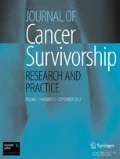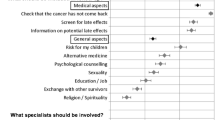Abstract
Purpose
Though the need for risk-based follow-up care for survivors of adolescent and young adult (AYA) cancer has been documented, survivors often report forgoing recommended care due to cost. We sought to understand whether additional barriers to follow-up care exist for AYA survivors.
Methods
We recruited survivors who were diagnosed with cancer between the ages of 15 and 39 using the Utah Cancer Registry (UCR). Overall, 28 survivors participated in 6 focus groups held between March and May 2015 in Salt Lake City and St. George, UT. Focus group discussions focused on the reasons survivors may or may not attend recommended medical visits after completing therapy.
Results
Survivors reported myriad barriers to follow-up medical visits, including lack of clear provider recommendation, fear of recurrent cancer diagnosis, wishing to move on with life, competing life responsibilities due to work and children, and not perceiving the need for a visit due to lack of symptoms.
Conclusions
Though cost likely plays a major part in follow-up care adherence for survivors of AYA cancer, in our focus groups, participants indicated there were many other psychosocial and logistic barriers to care. Such factors play an important role in the day-to-day lives of survivors and are critical in medical decision-making.
Implications for cancer survivors
Several factors impede follow-up care adherence for survivors of AYA cancer that are amenable to interventions, including clearer provider recommendations, flexible appointment times, and childcare availability in clinics.
Similar content being viewed by others
References
Coccia PF, Altman J, Bhatia S, Borinstein SC, Flynn J, George S, Goldsby R, Hayashi R, Huang MS, Johnson RH. Adolescent and young adult oncology. J Natl Compr Cancer Netw. 2012;10(9):1112–50.
Oeffinger KC, Tonorezos ES. The cancer is over, now what? Cancer. 2011;117(S10):2250–7.
NCCN clinical practice guidelines in oncology. 2013.
Oeffinger KC, Mertens AC, Sklar CA, Kawashima T, Hudson MM, Meadows AT, Friedman DL, Marina N, Hobbie W, Kadan-Lottick NS. Chronic health conditions in adult survivors of childhood cancer. N Engl J Med. 2006;355(15):1572–82.
Skinner R, Wallace WHB, Levitt GA, Late Effects Group LEG, UK Children's Cancer Study Group. Long-term follow-up of people who have survived cancer during childhood. The Lancet Oncology. 2006;7(6):489–98.
Weaver KE, Rowland JH, Bellizzi KM, Aziz NM. Forgoing medical care because of cost: assessing disparities in healthcare access among cancer survivors living in the United States. Cancer. 2010;116(14):3493–504.
Kirchhoff AC, Lyles CR, Fluchel M, Wright J, Leisenring W. Limitations in health care access and utilization among long-term survivors of adolescent and young adult cancer. Cancer. 2012;118(23):5964–72.
Keegan TH, Tao L, DeRouen MC, XC W, Prasad P, Lynch CF, Shnorhavorian M, Zebrack BJ, Chu R, Harlan LC, Smith AW, Parsons HM. Medical care in adolescents and young adult cancer survivors: what are the biggest access-related barriers? J Cancer Surviv. 2014;8(2):282–92.
Kaul S, Fair D, Wright J, Kirchhoff AC. Dental care for survivors of adolescent and young adult cancer: special considerations. J Adolesc Young Adult Oncol.
Kaul S, Fluchel M, Spraker-Perlman H, Parmeter CF, Kirchhoff A. Healthcare experiences of long-term survivors of adolescent and young adult cancer. Support Care Cancer. 2016:In Press.
Thompson K, Palmer S, Dyson G. Adolescents and young adults: issues in transition from active therapy into follow-up care. Eur J Oncol Nurs. 2009;13(3):207–12.
Palmer S, Mitchell A, Thompson K, Sexton M. Unmet needs among adolescent cancer patients: a pilot study. Palliative & Supportive Care. 2007;5(02):127–34.
Keegan TH, Lichtensztajn DY, Kato I, Kent EE, Wu XC, West MM, Hamilton AS, Zebrack B, Bellizzi KM, Smith AW. Unmet adolescent and young adult cancer survivors information and service needs: a population-based cancer registry study. J Cancer Surviv. 2012;6(3):239–50.
Arnett JJ. Conceptions of the transition to adulthood: perspectives from adolescence through midlife. J Adult Dev. 2001;8(2):133–43.
Arnett JJ. Emerging adulthood: a theory of development from the late teens through the twenties. Am Psychol. 2000;55(5):469.
Zebrack B, Chesler M, Penn A. Psychosocial support. In: Bleyer W, Barr R, editors. Cancer in adolescents and young adults. New York, NY: Springer Verlag; 2007. p. 375–85.
Eiser C, Kuperberg A. Psychosocial support for adolescents and young adults. In: Bleyer W, Barr R, editors. Cancer in adolescents and young adults. New York, NY: Springer Verlag; 2007. p. 365–73.
Hsieh HF, Shannon SE. Three approaches to qualitative content analysis. Qual Health Res. 2005;15(9):1277–88.
Klosky JL, Cash DK, Buscemi J, Lensing S, Garces-Webb DM, Zhao W, Wiard S, Hudson MM. Factors influencing long-term follow-up clinic attendance among survivors of childhood cancer. J Cancer Surviv. 2008;2(4):225–32.
Berg CJ, Stratton E, Esiashvili N, Mertens A. Young adult cancer survivors’ experience with cancer treatment and follow-up care and perceptions of barriers to engaging in recommended care. J Cancer Educ. 2015:1–13.
Group CsO. Long-term follow-up guidelines for survivors of childhood, adolescent and young adult cancers, version 3.0. Arcada, CA: Children's Oncology Group; 2008.
Landier W, Bhatia S, Eshelman DA, Forte KJ, Sweeney T, Hester AL, Darling J, Armstrong FD, Blatt J, Constine LS. Development of risk-based guidelines for pediatric cancer survivors: the Children’s Oncology Group Long-Term Follow-Up Guidelines from the Children’s Oncology Group Late Effects Committee and Nursing Discipline. J Clin Oncol. 2004;22(24):4979–90.
Butler G, Mathews A. Anticipatory anxiety and risk perception. Cognit Ther Res. 1987;11(5):551–65.
Smits-Seemann RR, Yi J, Tian T, Warner EL, Kirchhoff AC. A qualitative inquiry of childhood and adolescent cancer survivors’ perspectives of independence. J Adolesc Young Adult Oncol. 6.
Schwartz L, Tuchman L, Hobbie W, Ginsberg JA. Social-ecological model of readiness for transition to adult-oriented care for adolescents and young adults with chronic health conditions. Child Care Health Dev. 2011;37(6):883–95.
Zebrack B, Bleyer A, Albritton K, Medearis S, Tang J. Assessing the health care needs of adolescent and young adult cancer patients and survivors. Cancer. 2006;107(12):2915–23.
Zebrack B, Hamilton R, Smith, AW. Psychosocial outcomes and service use among young adults with cancer. Elsevier; 2009. p. 468–477.
Thompson K, Palmer S, Dyson G. Adolescents & young adults: issues in transition from active therapy into follow-up care. Eur J Oncol Nurs. 2009;13(3):207–12.
Smithson J. Using and analysing focus groups: limitations and possibilities. Int J Soc Res Methodol. 2000;3(2):103–19.
Skolarus TA, Zhang Y, Hollenbeck BK. Understanding fragmentation of prostate cancer survivorship care. Cancer. 2012;118(11):2837–45.
Acknowledgments
We gratefully acknowledge funding from the Department of Pediatrics, University of Utah (K2R2R funding program) and the National Institutes of Health (K07CA196985 to YW). Additional support was provided by the Huntsman Cancer Foundation and the Huntsman Cancer Institute Cancer Center Support Grant No. P30 CA42014 from the National Cancer Institute. The content is solely the responsibility of the authors and does not necessarily represent the official views of the NIH.
Author information
Authors and Affiliations
Corresponding author
Ethics declarations
Conflict of interest
The authors declare that they have no conflict of interest.
Electronic supplementary material
ESM 1
(DOCX 20 kb)
Rights and permissions
About this article
Cite this article
Smits-Seemann, R.R., Kaul, S., Zamora, E.R. et al. Barriers to follow-up care among survivors of adolescent and young adult cancer. J Cancer Surviv 11, 126–132 (2017). https://doi.org/10.1007/s11764-016-0570-3
Received:
Accepted:
Published:
Issue Date:
DOI: https://doi.org/10.1007/s11764-016-0570-3



